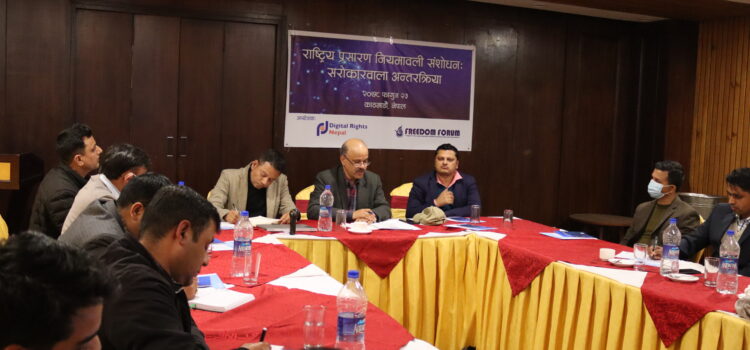Freedom Forum and rights defenders have expressed severe concern over the amendment of 10 Rules of the National Broadcasting Regulation, 2052. They expressed such concern during a discussion organized jointly by Freedom Forum and Digital Rights Nepal in Kathmandu on March 7.
During the event, Executive Chief at FF, Taranath Dahal, welcomed the participants and spoke about the faulty provisions in the amendment. He said the Regulation had gone beyond the provisions of National Broadcasting Act. It therefore has no legitimacy at all. It has further created confusion whether it wants to regulate internet platform or broadcasting. “How can a Regulation explain various things without any base in Act,” he wondered, adding that it had intended to suppress citizen’s right to free expression online.
With the amendment, the government has made it mandatory for the internet-based broadcasting (videos) to get license, which would charge Rs half million, he shared. In terms of FoE, Rule 2 (C.6.) of the Regulation is highly problematic, Dahal observed.
However, the categorization of age for content viewing is positive side of the amendment, Dahal viewed. Serious lack of consultation before amending Regulation questions political and bureaucratic accountability.
Similarly, Chairperson of Digital Rights Nepal, Santosh Sigdel, said the amendment invited confusion and criticism due to vague wording. “The objective of the amendment – to generate revenue, or to suppress internet users’ views or to regulate content is not clear,” he viewed, and argued it could be misused at any time to suppress free speech. Anything that comes under Regulation must be defined and determined by Act, which it lacked, according to him.
Sigdel also viewed there was only partial grievance mechanism. The provision of approval for frenchise is also a kind of pre-censorship.
Advocate Sanjeeb Ghimire wondered why the Regulation was speaking on substantive law. The amendment of the regulation (related to FoE) is therefore subject to repealing. Free speech on internet can not be licensed, he underscored.
Mass Communications and Journalism Teacher at Tribhuvan University, Prakash Acharya, said although there were problems in contents on online space, which could be treated with other laws, licensing for free speech (videos online) is objectionable.
Other journalists and right defenders affiliated to online media spoke against the licensing provision to the ‘online television’.
Rule 2 (C.6.) mentions ‘Online Television (Internet TV)’ should be understood as as the audiovisual materials produced by oneself and broadcast via internet.
Similarly, Rule 2 (C. 4.) mentions OTT, and Rule 2 (C. 5.) the VOD. As per the amended provision, ‘VOD’ should be understood as the scheme that provides programs, except television, to the consumers as per their demand by the firm that is licensed by the Ministry.
In the OTT, media streaming on the digital platform via internet is mentioned. For this, the use of DTH cable or satellite television should not be included, it adds.
——


